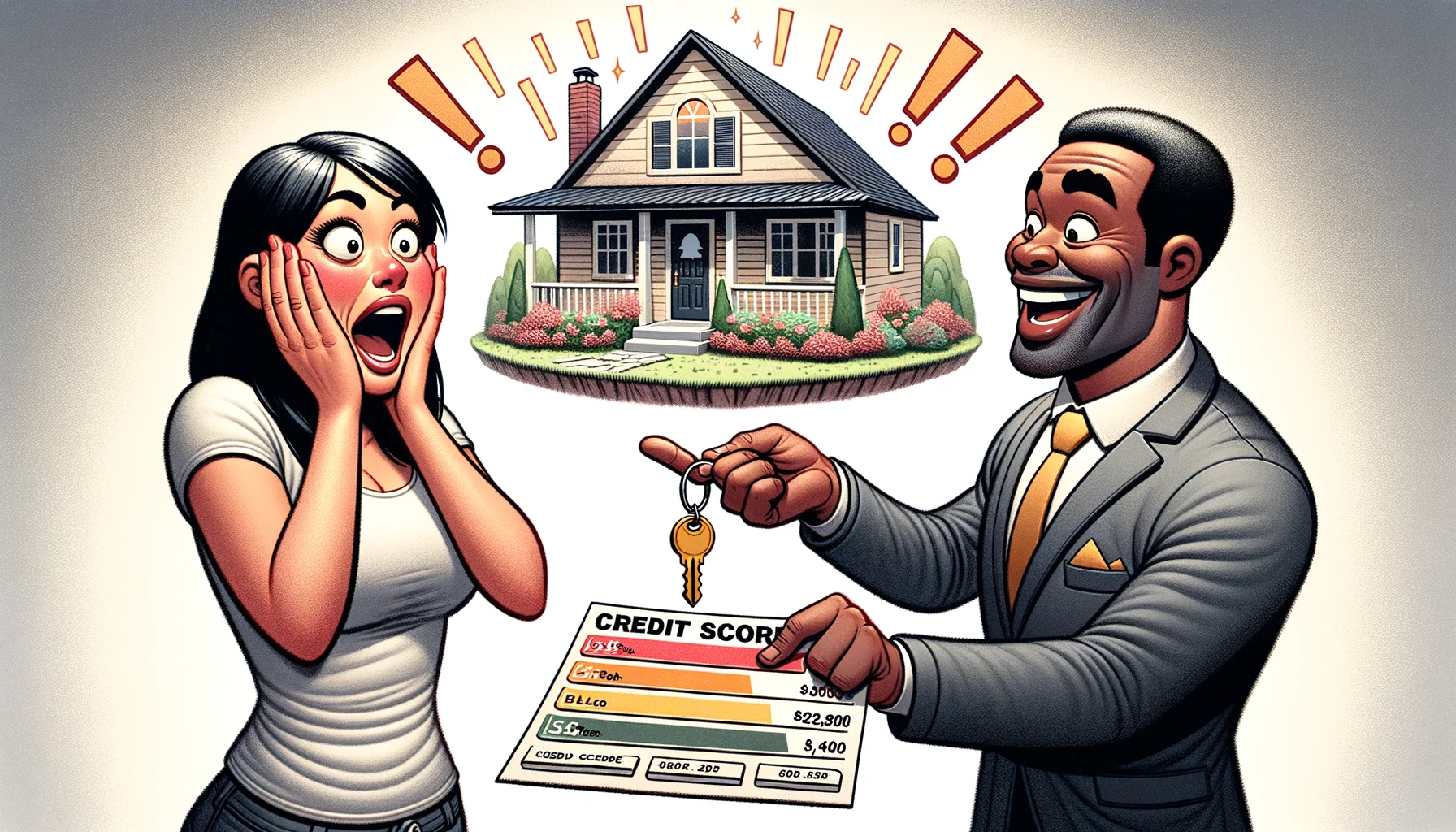Buying a house with bad credit Quiz
Test Your Knowledge
Question of
Understanding Bad Credit and Homeownership
Defining Bad Credit
What exactly is bad credit? It's a term that can send shivers down the spine of any prospective homebuyer. But fear not! Bad credit refers to a low credit score, which could be due to missed payments, defaulting on loans, or carrying high credit card balances. These little financial hiccups can have a big impact on your ability to borrow money for big purchases like a house. But here's the thing bad credit isn't a life sentence! It's a temporary setback that you can absolutely overcome with the right approach and mindset!
Now, let's talk about those credit scores . They range from 300 to 850, with anything below 580 generally considered as 'poor' by most lending standards. This magical number is what lenders use to gauge your creditworthiness. A low score might make them think twice before handing you a mortgage, but don't let that deter you! There are pathways to homeownership even with less-than-stellar credit, and we're here to explore them!
How Credit Scores Affect Mortgage Approval
It's no secret that your credit score is like the gatekeeper when it comes to securing a mortgage. Lenders look at this number as if it's a crystal ball, giving them insight into your financial past and predicting your borrowing behavior. The higher your score, the more doors open for you in terms of loan options and interest rates. But with bad credit? You might feel like you're knocking on those doors only to find them locked tight.
But wait it's not all doom and gloom! Even if your credit score isn't hitting the high notes, there are special loan programs out there designed just for you. From FHA loans to other government-backed options, there are ways to navigate the mortgage maze even with a credit score that's less than perfect. The key is to understand how these scores play into the approval process and then find the right lender who's willing to work with you.
Overcoming the Stigma of Bad Credit
The stigma attached to bad credit can feel overwhelming, like a dark cloud hanging over your dreams of homeownership. But hold on it's time to dispel those stormy skies! Having bad credit doesn't mean you're financially irresponsible or doomed to rent forever. Life throws curveballs; whether its unexpected medical bills or economic downturns, many people find themselves in this situation.
The first step in overcoming this stigma is embracing transparency. Be upfront about your financial history when discussing mortgage options with lenders. Remember, they've seen it all before you're not the first hopeful homeowner with a few blemishes on their credit report!
Strategies for Improving Your Credit Score
All right, lets roll up our sleeves and dive into some powerful strategies for boosting that credit score! First things first: check your credit report for errors theyre more common than you think and can be dragging down your score unfairly. Dispute any inaccuracies swiftly because every point counts when you're aiming for mortgage approval.
Beyond that, start paying down existing debt where possible especially those pesky high-interest credit cards. Keep track of bill due dates and set up automatic payments if necessary; timely payments are crucial for improving your score. And remember: dont close old accounts willy-nilly; they contribute to your credit history length and can actually help your score!
- Meticulously review your credit reports .
- Aim for punctual bill payments .
- Tackle outstanding debts , prioritizing high-interest ones.
- Maintain older accounts for length of credit history.
- Avoid taking on new debt while repairing credit.
- Contact creditors directly if struggling with payments.
In conclusion, while buying a house with bad credit might seem daunting at first glance, its absolutely achievable with determination and strategy! By understanding what bad credit means and how it affects mortgage approval, confronting the stigma head-on, and employing practical strategies for improvement, homeownership is within reach. So take heart your dream home awaits!
Exploring Mortgage Options for Bad Credit
Are you dreaming of owning a home but feel like your bad credit score is holding you back? Fear not! There are mortgage options available that cater to individuals with less-than-perfect credit scores. It's time to turn your homeownership dreams into reality, and I'm here to guide you through the possibilities that can help you secure the keys to your new home!
Understanding that traditional mortgages might not be accessible for everyone, especially those with credit challenges, is crucial. However, this doesn't mean the end of the road for aspiring homeowners. There are specialized loans designed with your needs in mind. Let's delve into these opportunities and find the best fit for you!
Government-Backed Loans
One of the most promising avenues for buying a house with bad credit is through government-backed loans. These loans are insured by federal agencies, which reduces the risk for lenders and can lead to more lenient credit requirements. Get ready to explore options like FHA loans, VA loans, and USDA loans each tailored to different needs but all with the common goal of helping you cross the threshold into homeownership!
The beauty of these programs lies in their flexibility and understanding that life happens, and credit scores don't always reflect one's true potential as a homeowner. With government-backed loans, you're not just a number; you're a future homeowner with aspirations and the drive to succeed. Let's take a closer look at one such option that could be your golden ticket FHA loans.
Advantages of FHA Loans for Low Credit Scores
FHA loans are a beacon of hope for those with lower credit scores! They typically require a lower minimum credit score than conventional loans, making them an excellent choice for buyers facing credit challenges. But wait, there's more! FHA loans often come with competitive interest rates, which means more savings for you in the long run!
- Lower Down Payments: An FHA loan can require as little as 3.5% down if your credit score is 580 or higher. That's right owning a home might be closer than you think!
- Credit Flexibility: Even if your score dips below 580, don't give up hope! You may still qualify for an FHA loan by putting down 10%.
- Closing Cost Assistance: Struggling with closing costs? FHA allows sellers, builders, or lenders to cover some of those costs.
The advantages of FHA loans make them an outstanding option for those who have been turned away by other lenders due to credit issues. It's time to take advantage of these benefits and make strides towards owning a home that will be the envy of all your friends!
Subprime Mortgages
Moving on from government-backed options, let's talk about subprime mortgages another viable path to homeownership for individuals with poor credit scores. Subprime mortgages aren't as scary as they sound! These are simply loans tailored to borrowers who don't meet traditional lending criteria due to their credit history.
This type of mortgage opens doors (literally!) by providing financing options when others say no. It's about looking beyond conventional boundaries and recognizing that everyone deserves a chance at owning their own home. If you've faced financial hurdles in the past, subprime mortgages could offer that fresh start you've been searching for!
Assessing the Risks and Benefits
Risks? Sure, but let's not overlook the benefits! Subprime mortgages can offer lower qualification standards in terms of credit scores and debt-to-income ratios. This means that even if your financial past has been rocky, there's still hope on the horizon.
However, it's essential to tread carefully subprime mortgages often come with higher interest rates and fees compared to standard mortgages. This is where your savvy decision-making comes into play! Weighing these risks against the potential benefits is key in determining if this route aligns with your long-term financial goals.
Preparing for the Home Buying Process
Get ready, future homeowners! The journey to buying a house with less-than-perfect credit is about to get EXCITING! You might think that bad credit is a roadblock, but let me tell you, it's more of a speed bump. With the right preparation and knowledge, you'll be unlocking the door to your new home in no time! So, buckle up as we dive into the essential steps of preparing for the home buying process!
Saving for a Larger Down Payment
First things first: Let's talk about saving for a larger down payment . This isn't just some casual advice; it's a game-changer! When you're dealing with credit issues, having a substantial down payment is like having an ace up your sleeve. It shows lenders that you're serious and capable of saving, which can increase your chances of getting approved for a mortgage. Plus, it can help you secure better terms and rates. So start pinching those pennies because every cent counts towards your dream home!
Now, I know what you're thinking: "But how much should I save?" Aim high! Typically, 20% is the golden number, but if you can go above and beyond, do it! The more you save now, the less you'll pay later. It's not just about meeting minimum loan requirements; it's about setting yourself up for financial success and stability.
And remember, when it comes to saving money, every little bit helps. Cut back on unnecessary expenses, pick up a side hustle if you can, and keep your eyes on the prize your future home!
How a Bigger Down Payment Can Offset Credit Issues
Here's the scoop: A bigger down payment can seriously offset those pesky credit issues. Think of it as a balancing act on one side, you've got your bad credit history; on the other side is your hefty down payment. The heavier your down payment is, the less your credit history weighs in the decision-making process. Lenders will see that large sum of money as proof of financial responsibility and commitment.
Bonus tip: A larger down payment also means you're borrowing less money. This translates into lower monthly mortgage payments and potentially thousands saved in interest over the life of your loan. That's like hitting two birds with one stone!
So don't let bad credit deflate your dreams! Boosting that down payment is like giving yourself an instant credit makeover in the eyes of lenders.
Gathering Essential Documents
All right folks, let's get down to business! Gathering essential documents might not be glamorous, but it's absolutely CRUCIAL in securing that loan approval. We're talking tax returns, bank statements, pay stubs these are the breadcrumbs that lead lenders to believe you're worthy of a mortgage.
Lenders aren't just going to take your word for it; they want hard evidence that you have a stable income and can manage your finances responsibly. And if there are any discrepancies or gaps in employment? Be prepared to explain them clearly and confidently.
The key here is organization. Keep all your documents neat and accessible. The smoother this part goes, the faster you'll move through the loan approval process.
Importance of Financial Documentation in Loan Approval
This cannot be stressed enough: Your financial documentation is like gold in the eyes of lenders! It paints a picture of your financial health and habits. Without this critical evidence, getting approved for a mortgage with bad credit would be like trying to run a marathon without training possible but incredibly difficult.
Lenders scrutinize these documents to assess risk. They want assurance that despite past credit challenges, you're now on solid ground financially speaking. They're looking for patterns of reliability and improvement signs that say "Yes! This person has turned their financial situation around!"
- Tax Returns: These show income consistency or growth over time.
- Bank Statements: They reveal how well you manage cash flow and savings.
- Pay Stubs: Proof of current employment and earnings.
- Credit Report: Even with blemishes, showing an upward trend can work wonders.
In conclusion (though we never really conclude because there's always more exciting stuff to learn), remember that gathering these documents isn't just busywork it's building the foundation for your home buying success story!
Navigating the Home Buying Journey with Bad Credit
Finding a Real Estate Agent Specializing in Credit Challenges
When you're diving into the housing market with a credit score that's less than stellar, it's absolutely CRUCIAL to partner with a real estate agent who is not just experienced, but also specializes in working with buyers facing credit challenges. This is a game-changer, folks! These agents are the superheroes of the real estate worldthey have the insider knowledge, the connections, and the sheer tenacity to guide you through the murky waters of buying a house with bad credit. They know every nook and cranny of the home-buying process and can find lenders who are willing to work with you. Their expertise could mean the difference between a rejected application and getting those coveted house keys!
But wait, there's more! These agents come armed with strategies tailored to your unique situation. They'll help you understand your credit report, suggest ways to improve your credit score before buying, and even identify down payment assistance programs. They're like personal coaches for your credit score, pushing you towards your goal of homeownership!
And let's not forget about their network! A top-notch agent has relationships with credit specialists who can offer invaluable advice. They'll connect you with mortgage brokers who have a track record of successfully helping individuals with low credit scores secure home loans. This isn't just about finding a house; it's about building a team that will back you up every step of the way!
The Role of an Experienced Agent in Home Purchases
An experienced real estate agent is more than just a facilitator; they're your strategic partner in this thrilling journey towards homeownership. They're well-versed in all things real estate and possess a deep understanding of how credit issues can affect your home-buying experience. With their guidance, you'll navigate through potential pitfalls like a pro!
Imagine having someone who knows precisely how to present your case to sellers and lenders, making them see beyond your credit score to the responsible, reliable homeowner you are destined to become. That's what an experienced agent does! They're master negotiators who know how to highlight your strengths and negotiate terms that work in YOUR favor.
And they don't stop there! Your agent will be by your side from start to finishsearching for properties, attending viewings, making offers, and even decoding that complex paperwork. Think of them as your personal real estate encyclopedia; whatever question or concern you have, they've got answers!
Understanding the Purchase Agreement
The purchase agreement is like the Constitution of your home-buying processit's THE document that outlines every critical detail about the sale. It covers everything from the agreed-upon price to contingencies that protect both buyer and seller. And when you have bad credit? Understanding this document becomes even more vitalit's your safeguard against any misunderstandings or legal snafus.
This legally binding contract ensures everyone is on the same pageliterally! It specifies what happens if either party fails to meet their obligations or if something unexpected comes up during inspections or financing. Knowing this document inside out means you're prepared for any scenario. You need to grasp every clause, every condition because this knowledge empowers you to make informed decisions.
- Closing Costs: Be aware of how much you'll need to bring to the table outside of the loan amount.
- Contingencies: Understand these conditions which allow you to back out without penalty under certain circumstances.
- Inspection Rights: Know your rights regarding property inspections and how they can affect negotiations.
- Possession Date: Confirm when you can actually move into your new home.
Legal Considerations for Buyers with Credit Issues
Legal considerations take on an extra layer of complexity when you're buying a house with bad credit. But fear not! With careful attention and expert advice, these hurdles can be overcome. For instance, some sellers might require higher earnest money deposits from buyers with lower credit scores as a show of good faithknowing such nuances can prepare you for negotiations.
You also need to be aware of state-specific laws that could affect your purchasethings like redemption rights after foreclosure or how community property laws might impact home buying if you're married. Legal jargon can be daunting, but understanding these terms is non-negotiable for protecting yourself throughout this process.
Last but certainly not least, always ensure that any agreements related to seller financing or rent-to-own arrangements are reviewed by a legal professional specializing in real estate law. This isn't just paperwork; it's the blueprint for your future home and financial stability. Dot those is and cross those ts meticulouslyyour future self will thank you!
Closing the Deal and Beyond
Home Inspection and Appraisal Considerations
Listen up, future homeowners! The journey of buying a house with bad credit doesn't end when you sign the offer; it's just getting started! A home inspection is your golden ticket to uncovering any hidden issues that could turn your dream home into a financial nightmare. We're talking about potential structural problems, outdated electrical systems, or even plumbing from the dark ages. Don't skip this step it's essential for protecting your hard-earned investment!
And let's talk appraisals they are not just a formality. An appraisal confirms that the price you're paying is in line with the home's value. This is crucial when you're securing financing, especially with bad credit. Lenders need assurance that their investment is sound, which in turn, secures your funding to close the deal. Make sure you understand every detail of these evaluations because they can make or break your real estate transaction!
Remember, knowledge is power! By being informed about the condition of the property and its market value, you're positioning yourself as a savvy buyer. Use this information to negotiate if necessary and ensure you're getting a fair deal. It's all about taking control of your future home and your financial destiny!
Protecting Your Investment with Thorough Evaluations
This is it you're on the brink of making one of the biggest purchases of your life! But hold on, because protecting your investment with thorough evaluations is non-negotiable. You need to be absolutely certain that what you see is what you get. That means delving deep into every nook and cranny during the home inspection process.
Demand transparency and insist on a comprehensive report that leaves no stone unturned. This isn't just about aesthetics; it's about ensuring that every aspect of the house meets or exceeds critical safety and quality standards. And if there are repairs needed, get those estimates upfront so you can plan accordingly.
And don't forget about environmental assessments! They might not be top-of-mind, but they are equally important. You want to ensure that your new abode isn't sitting on contaminated land or within a flood zone. Protecting your investment means thinking ahead and covering all bases!
Maintaining Homeownership and Rebuilding Credit
Alright, so you've navigated the treacherous waters of buying a house with less-than-perfect credit now what? It's time to focus on maintaining homeownership and rebuilding credit! First things first: set up a budget for mortgage payments and stick to it like glue. Late payments are not an option if you want to improve your credit score.
- Regularly review your credit report for errors or discrepancies.
- Prioritize debt repayment to reduce your overall financial burden.
- Consider refinancing options once your credit improves for better interest rates.
Maintaining homeownership also means being proactive about property upkeep. Don't let minor repairs become major expenses! Create a maintenance schedule and budget for routine tasks to keep everything in tip-top shape. This will not only preserve the value of your home but also prevent costly surprises down the road.
Last but certainly not least, continue educating yourself on financial management and real estate trends. Stay informed about market conditions in your area, explore ways to increase property value, and always be on the lookout for opportunities to enhance your financial well-being. Remember: owning a home is both an achievement and an ongoing responsibility embrace it with enthusiasm and dedication!












